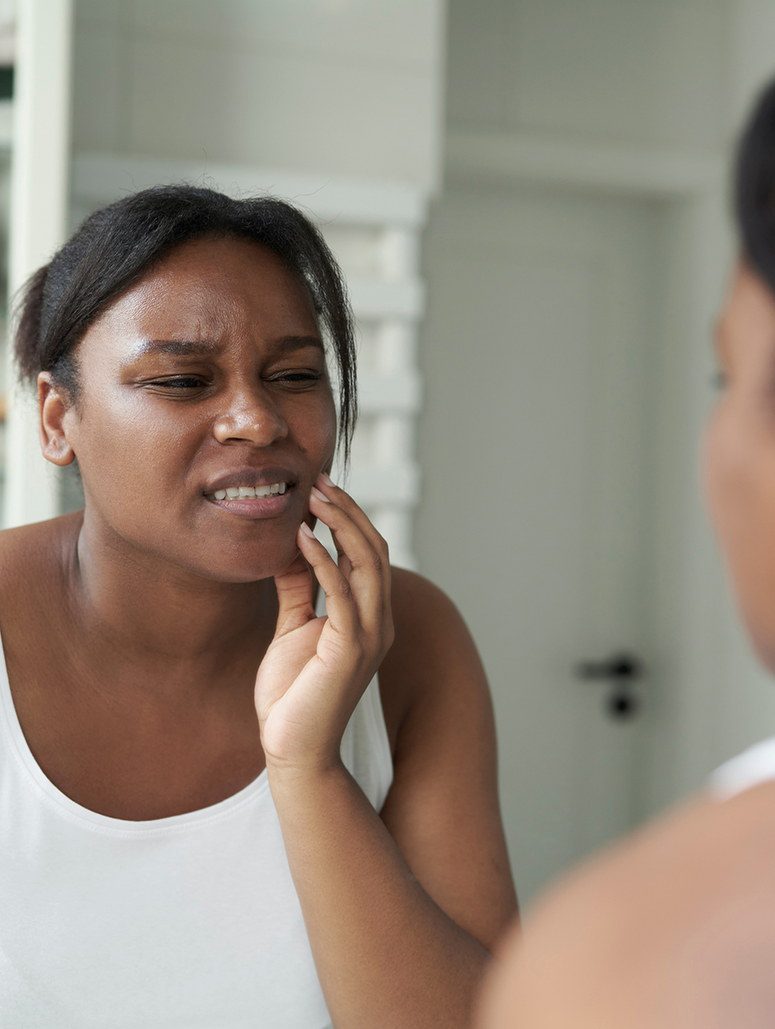TMJ Disorders & Bruxism
The temporomandibular joint (TMJ) is essential to the proper functioning of your mouth and is very important for a number of small everyday gestures, such as speaking, chewing, swallowing, yawning and so on. When it's dysfunctional, it can cause a host of problems. At Clinique Dentaire Wayne Dionne in Edmunston, we can detect these disorders and help you control their causes. Among them is bruxism (nocturnal teeth clenching and/or grinding), a condition for which there's a simple solution: bite plates.

Identifying TMJ disorders
TMJ dysfunction mainly affects adults between the ages of 20 and 40, and is more common in women than in men. Overall, it is estimated that 5-10% of adults will experience TMJ disorders.
Symptoms of temporomandibular joint (TMJ) dysfunction can manifest themselves in a variety of ways.
Here are some signs to look out for:
- Muscle pain in the jaw, on one or both sides, when chewing, yawning or opening the mouth;
- Discomfort in the temples, neck, in front of the ears or around the jaw;
- Cracking or popping sounds when opening mouth;
- Frequent headaches ;
- Swallowing disorders ;
- Difficulty opening mouth ;
- Blocking sensation when opening the mouth;
- Increased tooth sensitivity or changes in the way teeth fit together.
What you need to know about bruxism
Another telltale sign is bruxism (teeth grinding). With an estimated 6-8% of the Canadian population suffering from bruxism, and 14-38% of children being affected, it deserves special attention. Bruxism can cause damage not only to the temporomandibular joint, but also to the teeth, jaw muscles, gums and bone mass. It can also lead to neck pain and headaches, and compromise sleep quality.
Causes
There are several causes of bruxism, here are a few:
- Stress and anxiety;
- Certain medications ;
- Alcohol, caffeine and drugs;
- Smoking;
- Certain medical conditions, such as epilepsy, sleep disorders and Parkinson's disease.
Treatment of bruxism
There is no universal treatment for bruxism. However, a customized appliance, called an occlusal plate, can be designed specifically for you. This appliance helps to reduce the pressure exerted on your teeth and jaws, thus preventing jaws from clashing, grinding and abnormal tooth wear. What's more, the bite plate reduces unpleasant muscle tension.

Do you think you suffer from one of these disorders?
Don't wait any longer for a pain-free life. Our qualified team is here to support you every step of the way, and can provide information and advice to help you understand how TMJ works and the causes of bruxism. We can also put in place a solution to counter your problems (orthodontics, medication, an occlusal plate to manage bruxism, etc.) or direct you to the right resources, such as physiotherapy.
Would you like more information about our clinic or any of our services?
Contact us today
A member of our passionate team looks forward to meeting you and answering all your questions!
